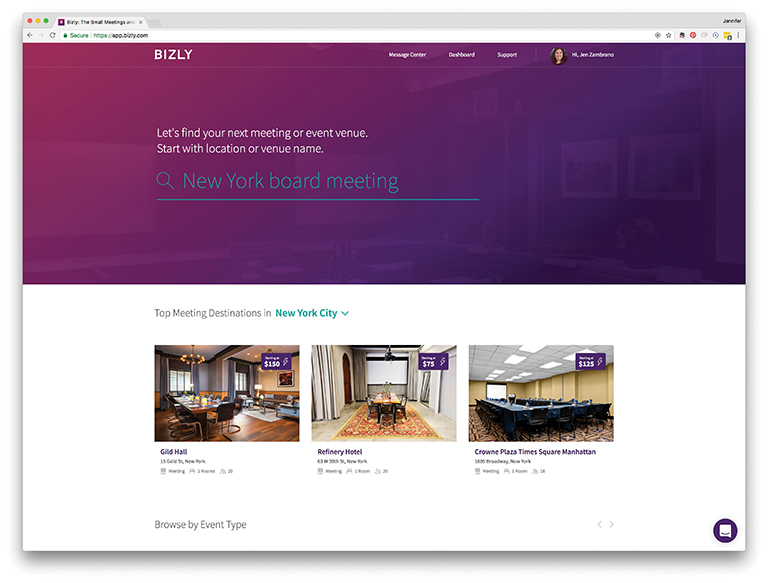
In 2014, venture capitalist Ron Shah was deep into a month of internal meetings when the pipes burst in
his building. The office’s conference space was flooded and unusable. He worked the phones in a rush, trying to clinch local hotel meeting rooms on short notice. But the phone-tag negotiations moved at the speed of molasses. Surely, he thought, there must be a less aggravating way to book small meetings.
Necessity might be the mother of invention, but nuisance is the big daddy of motivation. When a lightbulb went on in Shah’s head, he trusted it. No stranger to online innovation, he’d been an early advisor to MakeMyTrip — which went on to become the largest online travel company in India — and sold two companies to Google in 2014. So amid the flooding and frustration, he pivoted from another startup idea he was working on to pursue this: an online platform for automated, DIY instant bookings for small meetings. He called it Bizly.
“It took forever to get meetings booked,” Shah said of the conventional booking process that inspired Bizly. “You’d leave voicemails and hope they’d call you back, then end up with 10 phone calls between the RFP and the contract. What we did was radically improve upon existing workloads with end-to-end products.” Bizly puts the four to five different systems a company has used — for venue sourcing and coordination, legal contracting and reviews, credit-card management and payments, spend-data analytics, and event-management services — all in one place.
Shah’s team followed that streamlined philosophy and ease of use to build a highly visual platform. “There’s a way people want to buy things online,” by using apps that are easy to use, like Uber, Lyft, and Postmates, he said. “And that’s what resonated with us.” The result is a platform that looks like WeWork crossed with Airbnb: a shifting map of pinpoint property options, alongside specifications and availability and add-on options for each one, all integrated.
Cindy Heston, director of travel and events for Anthem, a health-insurance plan provider and Bizly subscriber, is a fan of the interface. “For me, the biggest challenges are in the small-meetings space — so many pieces and nothing is centrally organized with a bracket around it,” she said. “Bizly has a wrapper. You go into the site and understand it all: Here’s the preferred hotel, the restaurant, all the information on the particular location, whether there is a certain promotion in a certain market, if the hotel has a cancelation, where the employees might want to go out to dinner one night.”
Much of Bizly’s appeal for Marjan Ghaffari, a senior procurement analyst for meetings, events, and travel for software company Informatica, is its visual presentation of properties. “I actually enjoy going on,” she said, “and looking at all the pictures.”
A SUSTAINABLE MODEL
On average, there are 20-30 venues for each city, plus the nation’s first directory of restaurants with private dining rooms. Properties don’t have to pay to be listed, but can pay for perks like data-management benefits. Along with space needs, clients input their particular requests — say, food and beverage, audiovisual, length of event — and can either book instantly, or chat with the venues to further tailor their needs for small meetings. Bizly’s clients define “small meetings” for themselves: typically, by monetary threshold ($20,000 and under, $10,000 and under), number of sleeping rooms, or the absence of flight segments.
As early users shared their headaches and wish lists, Bizly quickly incorporated feedback. For example, Shah had thought payments would be straightforward, but found that in some situations, this can vary by the venue’s policy: deposit or no deposit; authorization of a credit card; balances due on a certain date, or paying in full in advance.
A major tweak has been with the business model. Initially, Bizly had been on-demand, pay-as-you-go, with clients from among a wide range of companies. But Shah found there was a limit to sustaining a business built on one-off meetings for the occasional user. That led him to establish enterprise accounts and relationships in the form of signed contracts. Subscription fees vary with the complexity of the client (for instance, a pharmaceutical client with regulatory requirements). The platform has also expanded to offer a concierge service for clients that want a bit of knowledgeable hand-holding instead of complete DIY.
This year, Bizly’s customers will spend an average of $6 million in meeting volume on the site (not including subscription costs), and the largest clients — which Shah expects to tally about a dozen by year-end 2018 — will spend around $10 million. He also expects to be offering international options by the fourth quarter, with about 20 locations that match subscribers’ needs.
“Companies are spending too many resources and too much time trying to get deals cut, and we believe we can solve of lot of these problems with software,” Shah said. “One thing we believe in as a company — it’s never ‘the big companies eat the small,’ it’s ‘the fast eat the slow.’”